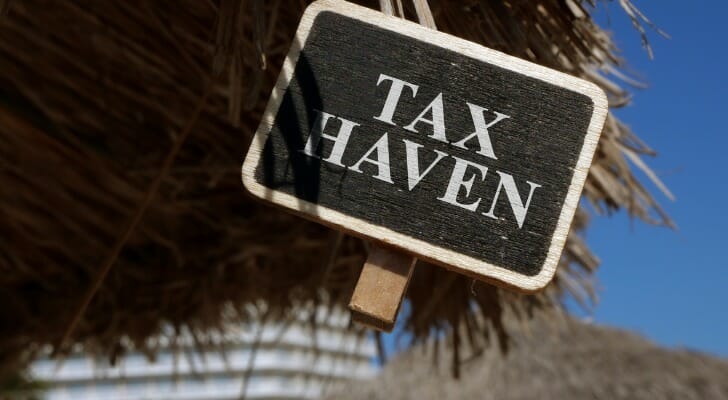From headlines about offshore accounts to debates over corporate tax avoidance, tax havens are often portrayed as mysterious, or even illegal, financial shortcuts. In reality, they’re complex jurisdictions with unique tax laws that can offer legitimate benefits when used correctly and serious consequences when misused. Understanding what tax havens are, how they work and where the legal lines are drawn can help individuals and businesses separate fact from fiction before making any cross-border financial decisions.
For advice or a closer look at your situation, consider working with a financial advisor.
What Are Tax Havens?
Tax havens are countries or jurisdictions that offer little to no tax liability for foreign individuals or businesses, often combined with financial secrecy and minimal reporting requirements. They are designed to attract outside capital by providing favorable tax laws, which can include low corporate taxes, no capital gains taxes or exemptions on certain types of income.
These jurisdictions typically generate revenue through fees, financial services or indirect taxes rather than income taxes. In many cases, tax havens also offer strong privacy protections that limit how much financial information is shared with foreign governments. This combination can make them appealing to multinational corporations and high-net-worth individuals seeking to reduce tax exposure.
It’s important to distinguish between using a tax haven and engaging in illegal tax evasion. Holding assets or operating businesses in low-tax jurisdictions can be legal if income is properly disclosed and taxes owed under home-country laws are paid. Problems arise when tax havens are used to hide income, misreport ownership or avoid required reporting.
Tax Haven Examples
Numerous countries and jurisdictions are often regarded as tax havens due to their investor-friendly regulations. Locations such as Switzerland, Bermuda and the Cayman Islands are notable examples.
Switzerland, for instance, offers a combination of low tax rates and stringent confidentiality laws, making it an appealing destination for wealth management. Additional advantages include its stable political climate and sophisticated financial infrastructure.
These are just a few examples of the many tax havens around the world. While tax havens are legal in many cases, there are concerns about their impact on global tax systems and the wider economy.
Some suggest that tax havens enable tax evasion, money laundering and other financial crimes. In addition, critics argue that tax havens contribute to global inequality and social injustice. Other say that tax havens promote investment, job creation and economic growth and that they play an important role in global finance and trade.
Benefits of Tax Havens
Tax havens have many benefits for businesses, individuals and other entities. The biggest benefits are lower tax rates, the protection of privacy and secrecy laws and asset protection.
Lower tax rates allow businesses, individuals and other entities to reduce their tax liability. This may allow businesses to invest more in research & development and to expand their operations. Privacy and secrecy laws have benefits both for businesses and individuals. For businesses, they can provide insulation from lawsuits, creditors and other legal issues. For individuals, privacy can be valuable, especially in the case of celebrities, high-net-worth individuals and other public figures.
In addition, tax havens often have stable political and economic environments. This can provide businesses and individuals with a secure and stable base of operations. For investors in countries with high levels of political and economic uncertainty, tax havens can act as a relatively safe place to keep their wealth.
The Legality of Tax Havens

The legality of tax havens is subject to varying interpretations. While some argue they are entirely lawful, others contend they are either illegal or unethical. The legal status of tax havens depends on multiple factors, including the laws of the home country, international tax treaties and agreements, and the specific regulations governing the tax haven itself.
Certain tax havens have laws that explicitly permit the use of offshore accounts and structures, while others enforce stricter rules requiring enhanced transparency and disclosure.
Ultimately, the legality of utilizing tax havens hinges on the unique circumstances of each case and the relevant jurisdictions’ legal frameworks. Individuals and businesses should seek professional advice to navigate these complexities and ensure full compliance with all applicable laws and regulations.
Tax Haven Alternatives
While many businesses and individuals look to tax havens, they aren’t the only way to reduce your tax liability. Here are a few tax-saving strategies that could be considered as alternatives to tax havens:
- Tax-deferred accounts: Tax-deferred accounts, such as 401(k)s, IRAs and other retirement accounts allow individuals to save for retirement while deferring taxes on contributions until retirement.
- Tax-free municipal bonds: Municipal bonds issued by state and local governments are generally exempt from federal income tax and, in some cases, state and local taxes. Investing in municipal bonds can be a tax-efficient way to generate income and diversify a portfolio.
- Charitable giving: Charitable donations to qualified organizations can be tax-deductible, reducing the donor’s taxable income. Additionally, donating appreciated assets, such as stocks or real estate, can provide a tax-efficient way to support charitable causes and potentially reduce capital gains taxes.
- Tax credits and deductions: Tax credits and deductions, such as the Earned Income Tax Credit, Child Tax Credit and mortgage interest deduction, can provide valuable tax savings for eligible individuals and families.
Bottom Line

Tax havens are as controversial as they are complex. Opinions about them are divided on their legality and ethics. While the use of tax havens can offer several benefits, such as lower tax rates, asset protection and access to global markets, they have their downsides. For instance, tax haves can enable tax evasion, money laundering and other financial crimes. Before considering a tax haven, one should work with a financial advisor and likely a tax attorney to remain compliant.
Tax Planning Tips
- Planning for your potential tax liability can be daunting. If you’re not a professional then it could be difficult to know what’s legal and how to navigate your own tax situation. A financial advisor can help with these situations. Finding a financial advisor doesn’t have to be hard. SmartAsset’s free tool matches you with vetted financial advisors who serve your area, and you can have a free introductory call with your advisor matches to decide which one you feel is right for you. If you’re ready to find an advisor who can help you achieve your financial goals, get started now.
- A financial advisor who specializes in tax planning can help lower your 1099 income taxes by harvesting your losses. This means that you will be able to use your investment losses to reduce taxes on 1099 income.
- Figuring out your taxes can be overwhelming. SmartAsset’s income tax calculators will help you calculate federal, state and local taxes.
Photo credit: ©iStock.com/designer491, ©iStock.com/giuliano2022, ©iStock.com/kali9
